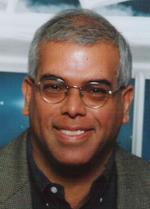
Are you a Polymath?
A polymath ( Greek polymathis – “having learned much”) is a person, with superior intelligence, whose expertise spans a significant number of different subject areas. In less formal terms, a polymath (or polymathic person) may simply be someone who is very knowledgeable. Most ancient scientists were polymaths by today’s standards. Yes, we’re now going feature an interview with Sarah Palin.
Oh wait… I just heard that Sarah is unavailable today, so we’ll have to make do with another polymathic personality: the one and only Vinnie Mirchandani. Vinnie is the Lord of the technology blog (visit his famous Deal Arthitect and New Florence blogs). Since early 2005 he has been consistently discussing and prophesizing about every facet in the technology and services universe: from busness process angioplasty to Cloud computing, from airline travel experiences to Sesame Street… yes, I have to confess Vinnie is one of the inspirations (or should I say perspirations) that drove me to the blogosphere.
And if you think cranking out three blog posts a day while running a consulting business is wearing on your literary talents, try writing a 23 chapter anthology that takes us on the ultimate journey through the world of information technology innovation and its impact on today’s globally-integrated society. Yes, Vinnie’s literary debut is forthcoming with his new book “The New Polymath”. You can pre-order today his book today at amazon.
I caught up with Vinnie earlier to tell you a little more about his inspiration behind the book…
Vinnie, what’s the significance of the name “The New Polymath”?
Phil, a Polymath is a Renaissance Person like Da Vinci, good at many disciplines. The New Polymath in my book is an enterprise which is comfortable with a wide range of technologies and has learned to package 3,5,10 strands of infotech, cleantech, nanotech, biotech etc into complex new solutions to solve some of the big and small problems we face.
A number of people know of my Deal Architect blog. But, the real joy for me has been my other innovation focused blog, New Florence. New Renaissance. Over 5 years I have posted over 2,000 entries in 40 tech categories from mobile computing to nanotechnology. Many recent entries have focused on innovations in the consumer space and in social networks – as you know that’s where the buzz has been.
Nice, but those are hardly complex problems compared to the some of the grand challenges the National Academy of Engineering has laid out, including ensuring plenty of clean water around the world and reverse engineering the brain.
Fortunately, as the database of posts grew year after year, I started to notice two patterns. I was seeing ever-more complex products and services that blended a variety of technologies. An example was General Electric’s plans for the Net Zero Home (as in zero annual energy costs), which plans to bring together solar, wind, next-gen battery, smart grid interface technology, and energy management software to efficient appliances, water heaters, and other devices at home. Or the BP CTO group, which effortlessly weaves sensory networks, predictive analytics, and other technologies to bring innovation to a variety of refineries, exploration sites, and other aspects of its global reach.
I was also seeing refugees from information technology increasingly move into cleantech and healthtech. Ray Lane, ex Oracle, and Bill Joy, ex Sun, are key leaders at Kleiner Perkins, which has made 50-plus investments in cleantech. Little in Kleiner’s past success as a venture capitalist in information technology (including blockbuster investments in Netscape, Amazon, eBay, and others) prepared it for a world of methane and selenium. Yet here the company is, reinventing itself learning new sciences while investing in a new generation of entrepreneurs who are helping the United States catch up to the Germans and trying to stay ahead of Chinese, Japanese, and other investors in cleantech. Similarly, Google, Microsoft, and others are increasingly offering products in the healthtech market.
Those are modern-day polymaths, I thought. That led to do interviews and write on 8 Polymath organizations – GE, BP, salesforce.com and others who have shown the ability to effortlessly package multiple technologies. I then also interviewed another 100+ innovators who are pushing the ball forward in specific areas like next-gen analytics and sustainability the Polymath enterprises are leveraging.
And, I know I enjoyed reading it, but what are the main things you’d like readers at “Horses” to take away?
There are huge new technology markets around cleantech, healthtech etc that IT outsourcers can target. You can already see firms like IBM are starting to tout them in their “Smart Planet” series. But they are still really doing IT work on these projects, and even there, back office IT work. That’s needed but it’s not “innovation “stuff anymore. So, for well-trodden technology paths, they are significantly overpriced. I have seen in a couple of “Smart Grid” projects in the utility industry, the outsourcer’s proposal for updating the back office billing and service application kill the ROI for the real innovation areas. So, outsourcers will have to commoditize basic IT skills and learn new types of energy, medicine and algorithms to justify premiums. They will also need to work with a whole new set of vendors and technologies to succeed in those emerging markets, and the book catalogs many.
Outsourcers also have the opportunity to dramatically innovate their own operations. There is a chapter in the book on Cloud Computing which is allowing clients to question long-term, fixed price infrastructure outsourcing contracts. They want variability in supply and economics of such services. SaaS vendors like salseforce.com and NetSuite profiles in the book are showing massive scale in shared application services, that few outsourcers can match today. Telepresence and growing experience with global delivery is leading clients ask why consultants have to travel to their site week after week and rack up another 20-30% in expenses. BTW, global delivery cannot just be India delivery any more. As Cognizant, one of the case studies in the book shows, you need to leverage talent pools everywhere to take advantage of linguistic, application, time zone factors. Data centers from which outsourcers provide services, will have to compete with those Google and amazon have set up over the last few years with Crowdsourcing models and communities, also discussed in the book, are allowing clients experiment with different ways of sourcing talent. So, plenty of opportunities to innovate outsourcing business models and operations.
And you said the book will be available in June… can we alter readers here when it is published, so they can order it directly?
The book is coming out in June. You can pre-order today at amazon http://bit.ly/boPIfK or Barnes or Noble http://bit.ly/cxa7Sc or Borders http://bit.ly/b8mfMe. For larger orders, I have made other arrangements so reach out to me.

Vinnie Mirchandani
Vinnie Mirchandani, (pictured left) is founder of Deal Architect, is a former technology industry analyst (with Gartner), outsourcing executive (with PwC, now part of IBM) and entrepreneur (founder of sourcing advisory firm, Jetstream Group). He is a thought leader on trends in software, outsourcing and offshoring. He has personally helped clients evaluate and negotiate technology contracts valued in excess of $ 5 billion and has consistently advised companies on IT risk management, globalization and sourcing issues.
Posted in : Cloud Computing, IT Outsourcing / IT Services, kpo-analytics, Outsourcing Advisors, Outsourcing Heros, SaaS, PaaS, IaaS and BPaaS, Social Networking






[…] Horses for Sources – Phil Fersht […]